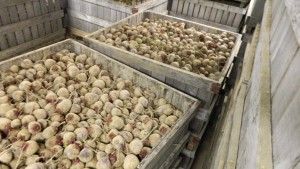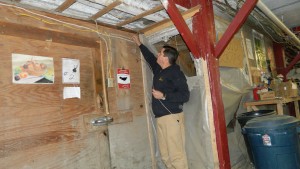We recently completed a project aimed at improving the ability of Vermont vegetable farms to store crops such as beets, carrots, parsnips, potatoes, onions, squash and sweet potatoes, all of which have unmet demand in late winter when local supplies run out.

The physiology of these crops allows them to be stored for many months after harvest if specific storage conditions are met. However, several distinct sets of conditions are optimal for different groups of crops, and achieving each condition requires careful control and monitoring of temperature and relative humidity in storage. Currently, Vermont’s commercial vegetable farms rarely achieve the optimal conditions due to lack of sufficiently separated storage compartments, and lack of modern environmental monitoring and control equipment.

This project installed environmental monitoring equipment to improve storage conditions and ultimately the quality of 1,736 tons of winter storage crops at 9 farms throughout Vermont . The cumulative market value of these storage crops produced during the 2012-2014 growing seasons was $3.5 million. Improved storage monitoring led to better control of storage conditions, in part through automated notification to farmers when abnormal conditions were occurring. This allowed for prompt correction of problems such as open doors and failing or inoperative cooling equipment. Losses of storage crops (cull rates) were reduced from ~15% to ~5% of stored volume. Sixty-six energy efficiency measures were also implemented at 5 of these farms, saving a total of 40,269 kWh of electricity and $5,800 annually. The systems deployed have increased the confidence of growers to expand their winter storage of Vermont-grown vegetables, leading to an increased supply of local produce outside of the traditional growing and marketing season.
You can download the complete report here.
